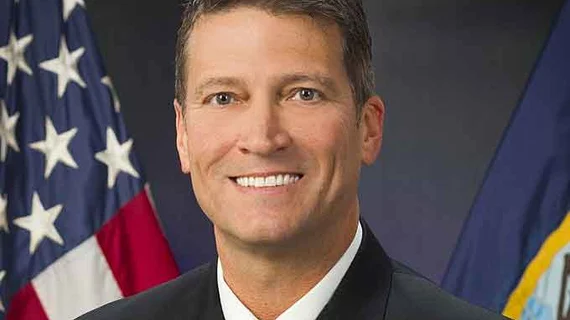VA Secretary nominee withdraws after allegations he drank on duty, overprescribed opioids
White House physician Ronny Jackson, MD, announced he’s removing himself from consideration as Veterans Affairs Secretary over allegations he was often drunk on the job, improperly prescribed opioids and created a “hostile work environment” at various stages of his career.
In a statement released by the White House, Jackson said he’s “regretfully” withdrawing his nomination, saying he “did not expect to have to dignify baseless and anonymous attacks on my character and integrity.”
“The allegations against me are completely false and fabricated,” Jackson said. “If they had any merit, I would not have been selected, promoted and entrusted to serve in such a sensitive and important role as physician to three presidents over the past 12 years.”
Nominated after the controversial dismissal of VA Secretary David Shulkin, MD, Jackson’s selection was first questioned on his qualifications, having never run an organization anywhere near the size of the vast VA bureaucracy. He also had to assure senators he was opposed to privatizing veterans’ healthcare, a position Shulkin had claimed led to pro-privatization officials forcing him out of the agency.
After these allegations first came to light, the Senate Veterans Affairs Committee announced on April 24 it would postpone Jackson’s confirmation hearing. Democratic staff on the committee wrote a document which listed a range of allegations from what they said were 23 current and former colleagues of Jackson. Among the accusations were he once wrecked a government-owned vehicle while drunk and provided a “large supply” of the opioid Percocet to a White House military office staff member, all claims Jackson denied.
The memo alleged Jackson was so loose with writing prescriptions for controlled substances that he earned the nickname “Candyman.” He was also described as “the most unethical person I have ever worked with” over his alleged drinking, prescribing habits and reports of “screaming tantrums” and “vindictive” behavior as he was promoted and gained more authority.
The top Democrat on the VA Committee, Sen. Jon Tester of Montana, thanked those who “bravely spoke out” against Jackson in a statement after the doctor withdrew his nomination.
“It is my Constitutional responsibility to make sure the veterans of this nation get a strong, thoroughly vetted leader who will fight for them,” Tester said. “The next Secretary must have a commitment to reform a strained health care system and a willingness to stand up to special interests who want to privatize the VA. My sleeves are rolled up and ready to work with Chairman Isakson to vet and confirm a Secretary who is fit to run the VA.”
Jackson’s withdrawal leaves many issues unresolved for the next VA Secretary. Beyond concerns about privatization, the $16 billion deal for Cerner to transition the VA to its electronic health record system remains in limbo as no contract had been finalized before Shulkin left the agency.

